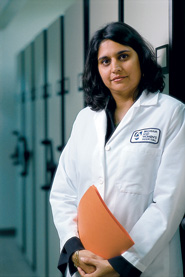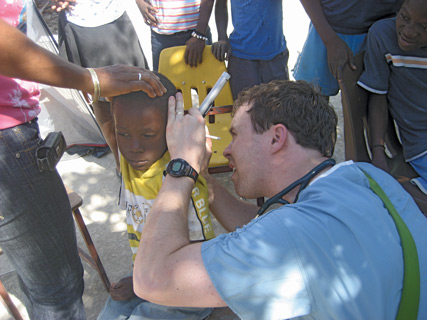With EHRs or paper, outpatient practices can improve safety
The idea is evolving that improving transitions of care from hospital to outpatient settings reduces readmissions. From medication lists to tracking labs to missed referrals that delay diagnosis, an expert in the field considers it all.
Although she works for a hospital, Tejal Gandhi, MD, spends much of her time trying to make health care safer for outpatients. Dr. Gandhi, the executive director of patient safety for Partners Healthcare in Boston, was honored last year by the National Quality Forum and The Joint Commission for her groundbreaking research in ambulatory patient safety. She talked recently with ACP Internist about some of the most pressing safety issues in outpatient care.
Q: Inpatient safety has gotten a lot of attention lately from the media and been the focus of quality improvement efforts. Are there outpatient safety issues that deserve the same focus?
A: Yes. I think there are issues that are purely outpatient and issues around transitions of care from inpatient to outpatient settings that both deserve a lot of attention. Lately, the transitions of care issue has started to get a lot of attention because there's been a focus on reducing readmissions at a national level, a component of which involves improving how we do discharges.
Q: What are some of those “purely outpatient” issues?
A: The first is medication safety, which encompasses medication errors in prescribing. We know there are a lot of medication errors that happen in the outpatient setting. We know that things like e-prescribing or computerized prescribing can potentially help reduce these errors. There needs to be ntinued focus on implementation of these kinds of systems.
Q: For practices that have e-prescribing, what other improvements may be needed?
A: There's also a lot of evidence that even when you're using an electronic medication record, the accuracy of the medication lists in the electronic medical record can be poor. If you're relying on medication lists and allergy lists because you're expecting the system to alert you about drug or allergy interactions, then you need to make sure those lists are accurate.

In the past, The Joint Commission has emphasized outpatient medication reconciliation, and at every appointment, making sure we know exactly what medications a patient is taking and also making sure that the list is documented. I think this is an area where we still struggle quite a bit, especially with workflow issues, and then we lose a lot of the value of electronic prescribing because we don't have the right medications on the list.
Q: What improvements are in the works on the software side?
A: There have been a lot of concerns about computerized prescribing. Doctors complain that it is too interruptive and there are too many alerts. Some of the alerts are not that important and it's very destructive to workflow. We have made efforts to streamline the way we alert providers and only alert on the really important things, not the “kitchen sink.” I think electronic medical record system vendors need to learn from some of the research that's been done, to improve how they do alerting so that it's more effective.
Q: What other outpatient safety issues are you working on?
A: Another major area in the outpatient setting is missed and delayed diagnosis. These missed and delayed diagnoses happen for multifactorial reasons, but if you think about it from a systems perspective, there are several areas of interest. One is test result tracking and follow-up and one is referral management.
Q: What's going wrong with test result tracking?
A: We know that most providers don't have good systems for tracking all of the tests that they order and making sure that those results come back to them. Most testing areas are very good about notifying about critical test results, but are not so good about notifying about clinically significant results. An example of that would be a CT scan that shows a new pulmonary nodule. That's not something you need to page someone at two in the morning about, but it is something that a testing area should make sure that they've communicated and that the receiving doctor has acknowledged receipt.
Another area in test results is tests that are pending at the time of hospital discharge. Patients are often discharged with results that are pending and it's unclear who needs to follow up on those test results. For example, the PCP [primary care physician] may not know that there is an HIV test still pending at discharge. The hospitalist goes off service and never gets the report. [We're] really thinking about all the ways things can fall through the cracks and trying to identify processes or systems at a practice level or at a hospital level to plug those gaps.
Q: What goes wrong with referrals?
A: A theme that's come out of malpractice cases is that the physician will refer somebody for evaluation of a symptom such as a breast lump. However, if the patient doesn't go to the referral, the PCP often doesn't know, and then the patient comes back a year later with a delayed diagnosis. It may not be so critical for the referral for a routine eye exam, but if you're referring for a specific issue like rectal bleeding or breast lump, there should be systems that let you know that the referral was complete and that make sure you get information back from the specialist.
Q: Who should handle this tracking?
A: Doctors in general are so stressed already in terms of the amount of work they have to do. A lot of what I'm talking about doesn't have to be done by physicians. It could be technology, it could be medical assistants, it could be other clinicians in a practice helping to do this work, and then notifying the physicians about the key breakdowns.
Q: Does a practice have to have an electronic system?
A: There are some practices I've seen who, with pure paper systems, keep excellent track of every test they order and make sure they come back. They literally use an accordion file and they have one of the nurses reconcile the results coming in with the results that went out. It's a totally paper process and it works. However, this can be very labor intensive, and so in the long term, and especially for larger practices, I think electronic medical records will be very helpful.
Q: What's the role of patients in these efforts?
A: We've done some pilots here at Partners, for example, where you send patients reminders about mammograms and Pap smears in addition to the reminder going to the physician. If you have a Web portal where patients go to do their prescription refill requests and their appointment requests, that can be a place also where they can receive a reminder.
In our patient portal, we're starting to send patients their test results. If everything else fails and the physician never sees the result, it's one more check. We've had anecdotes of physicians saying, “The patient saw that PSA and they asked me about it and, you know what, I hadn't seen it.” It is a final check; it's just not one I want to rely on, because patients aren't always going to be going online to look at their results.
Q: What can outpatient physicians do to reduce the risks of transitions?
A: It's really important to be able to get a copy of the discharge summary when your patients leave the hospital. I know of some efforts here in Massachusetts where they're having cross-continuum teams where the hospitalists are meeting with the PCPs to talk about standards of communication. The PCPs have to engage in the discussions so the hospitalists can know what it is they feel like they need.
I think a big piece on the PCP end—one of the biggest complaints we hear from the hospitalists—is that we have this patient we're discharging and we really want them to see their PCP and we can't get them in for two months. Readmission studies have shown that in 30-day readmissions, half of the patients didn't see their doctor in that 30-day period. It's really important to see somebody within a week or so of discharge. A lot of times practices don't have their scheduling set up so they can accommodate that. Having a few open slots just for post-discharge appointments that you can book at the last minute might be helpful.




